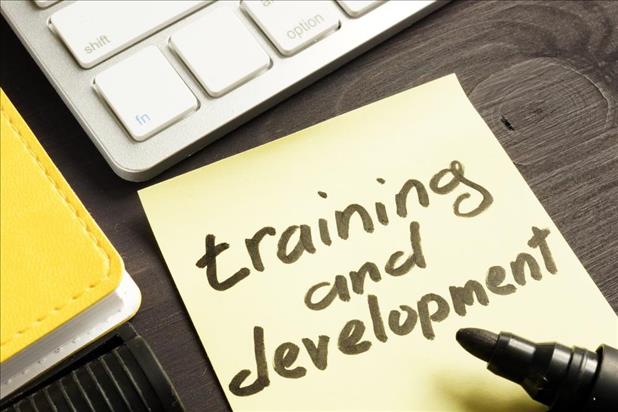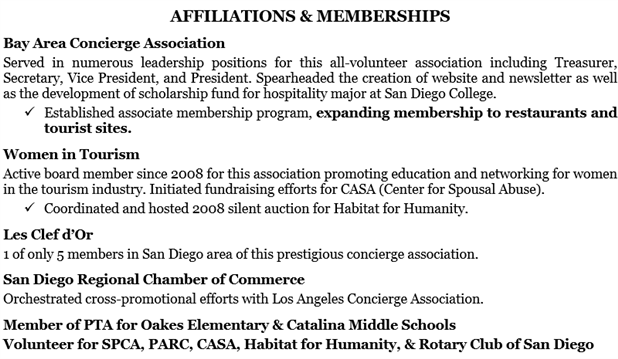- Job Seeker Resources
- |
- Last Updated: February 08, 2023

Successful resumes include a summary, core competencies section, and of course, your professional experience. But what about all those other details that showcase your unique skills? You may be unsure how to list education on your resume. Or, you may be wondering, “Should I include volunteer work on my resume? Where do I put my certifications?”
Some of these extra details – education, training, memberships, licenses, and volunteer experience – can help you stand out as a candidate and deserve a place on your resume.
Generally, supplemental information on your resume belongs at the end. However, keep in mind, not all of them will apply to you, and where you place them depends on many factors. For example, if you are a recent graduate, your education should be on the top half of your resume. If you have impressive credentials that most of your competition can’t offer, like a dual certification, you should highlight them at the beginning of your resume.
Here are some of the common supplemental sections, tips on what to include in them, and examples of how to present them in your resume.
Learn How iHire's Resume Builder Tool Can Help You Stand Out
Education
This is a popular section but will be presented differently depending on your situation. Here’s how to list education on your resume:
- Include your degree, major, and college/university name and location. Only include your graduation year if you graduated recently.
- Include your GPA if it was 3.8 or higher.
- Highlight honors, awards, scholarships, leadership activities, and/or community involvement.
- If you’re a recent graduate, you can mention a couple relevant courses you completed. Note: only include coursework if it’s applicable to the job you’re applying for.
- Didn't graduate or currently working toward your degree? You can still mention the degree (which will help you get past the ATS) by adding "Coursework" or "Candidate" and an expected graduation date.

Make Resume Writing Easy
Sign In To Access Helpful Resume Tools

Job Seeker Sign In
We Value Your Privacy
Professional Memberships
If you play an active role in an organization that highlights skills or industry expertise relevant to the job you’re applying for, put professional memberships on your resume. Use the following guidelines:
- Include organization name and your title (if something other than "Member").
- If you are not currently a member but still want to put the professional membership on your resume, give the start/end years or list "Former Member."
- Mention specific contributions, such as fundraising or event planning.

Job Seeker Sign In
Training and Professional Development
This section can be a great way to supplement your work experience, especially for career changers and recent graduates. Here’s what we suggest:
- Training and professional development can be included with education, but make sure the section doesn’t become too lengthy. It shouldn’t take away from the meat of your resume.
- Include the course/seminar/workshop title, instructor and/or sponsoring organization, and year.

Certifications, Licensure, and Other Professional Credentials
If the job you’re applying for requires certain certification or licenses, this section is critical. It can also be a great way to set yourself apart from other candidates. We recommend the following:
- Only list active/current credentials. If you want to include a past certification or license, make sure you designate "inactive" or "not current."
- Order your credentials by significance – for example, a national board certification in nursing would go above CPR or first aid.
- Display license number if applicable. The hiring manager will most likely search for it on an online database anyway.

Volunteer Experience
Volunteer experience can be especially beneficial to industries such as pharmacy, healthcare, social work, or education. It not only demonstrates involvement within the community, but also calls out work you’ve accomplished in addition to internships, clinical rotations, or field work. Here are some tips for including volunteer work on your resume:
- Only include experiences that are relevant to the job you’re applying for. Pick out key volunteer work and exclude all miscellaneous info.
- Highlight accomplishments and skills that you developed.
- Include the dates and locations of your volunteer work.

For an effective resume, only include supplemental information that will help prove your case as a candidate (e.g. a degree in your field, a certification that will allow you to better perform the job, or a volunteer experience that helped you develop a valuable skill for the role you’re applying for). So long as you highlight your talents and present your sections clearly, supplemental information on your resume will help you stand out as a top candidate.
Once you’ve mastered Resume Writing 101, check out our library of expert interviewing advice.

Originally Published: December 18, 2019
Sign In or Register to access all articles and insider tips for help in your job search.
Search for Banking Jobs
RELATED JOBS
At U.S. Bank, were on a journey to do our best. Helping the customers and businesses we serve to...
Personal Banker Associate IIMake banking a Fifth Third better We connect great people to great opportunities. Are you ready...
Healthcare Loan CloserAt U.S. Bank, were on a journey to do our best. Helping the customers and businesses we serve to...
Relationship Banker - Marysville - Marysville, OHYou have a passion for helping customers, building relationships, and delivering extraordinary...
Pharmacy Customer Service AssociateModels and delivers a distinctive and delightful customer experience. Registers sales on...
RELATED RESOURCES
Find the Right Job Faster
- Get personalized job matches sent to your inbox every day
- Connect directly with employers before your competition
- Advance your career with expert advice on interviewing, salary negotiation, and more
We value your privacy




